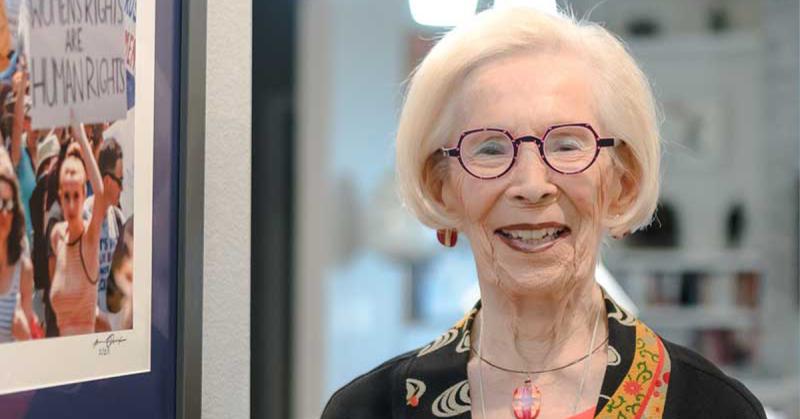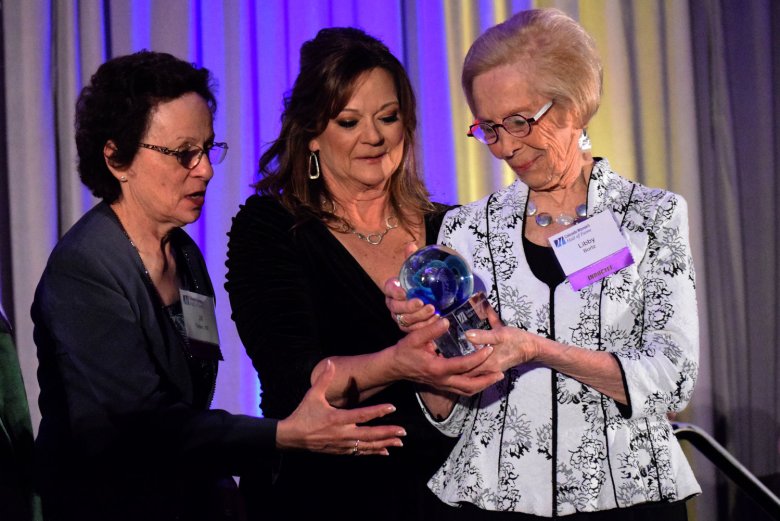The Road to Social Work
As Bortz’s children aged, she realized “I needed to be something besides a wife and mother.” She still wanted a career that helped other people, so she set her sights on medical school. But when she inquired at the University of Colorado Medical School admission office, the dean of admission told her, “Don’t bother — you’re too old.” Bortz was 27.
Bortz recalls, “I felt like there was discrimination. Only 6% of their class was female.” In response, Bortz sued the school. The legal action eliminated gender quotas and opened the medical school to women; law schools soon followed.
In the meantime, Bortz chose a profession where women were welcome: social work. She enrolled at GSSW, where she received a National Institute of Mental Health fellowship that introduced her to clinical social work. Although she had initially planned to be a medical social worker, Bortz found she “absolutely adored” clinical social work. Following graduation, she went to work for the Arapahoe Mental Health Center, where she worked for more than a decade.
Two thirds of her mental health center clients were women who were negatively affected by some of the same systemic issues Bortz had faced. For instance, prior to the Equal Credit Opportunity Act of 1974, U.S. women could be denied credit based on their gender or marital status, and millions of women lacked financial independence as a result. Bortz recalls, “I recognized I sort of didn’t exist — my credit card was in my husband’s name. I thought, ‘How unjust.’” So, she set out to change lending practices and ended up with her own credit cards. When the Women’s Bank of Denver opened in 1978 — the nation’s second nationally chartered women’s bank — Bortz was among its initial investors.
Bortz says, “Before I went to grad school, I was thinking, ‘How do I make a difference by seeing only one client at a time?’ [Clinical social work] gave me the bigger picture. I needed to do something about … the status of women. I realized I wasn’t going to be able to change the whole world as a social worker, but I could begin to make some inroads.”
Because access to affordable, stable housing was another need her clients faced, Bortz pushed to establish the Littleton Housing Authority in 1971. Littleton was one of the first suburban communities in the nation to do so. She was a charter member and ultimately served with the housing authority for 47 years. Bortz also convened all the housing authorities in the state and served as first chairperson of the Colorado Association of State Housing Authorities.
Later, when the Nixon administration rescinded funding for a high-rise apartment building for older adults — the first such project in the six-state region — Bortz appealed to the U.S. Department of Housing and Urban Development (HUD) and Colorado’s congressional delegation. When those efforts were unsuccessful, she organized a protest and invited the media to attend. The Nixon administration returned Littleton’s allocation. Bortz observes, “If you shame the government, at times they respond.”
Bortz recalls visiting the regional HUD office and being the only woman in a room full of men. As chair of the Littleton Housing Authority, she was there to sign documents to accept funding for the Bradley House senior apartment project. Bortz recalls, “The HUD director was a political appointee. He said to me, ‘Just remember baby, you’ll never get into the men’s locker room.’ It took my breath away.” Bortz replied, “That’s never been a goal of mine” and walked out of the office with the federal allocation papers in her hand.
In 2023, Bortz told the Littleton Independent, “Women were supposed to know their place, and I broke that mold. I just felt that what I was doing was humane. It was right. That we deserved whatever opportunities might be out there to try for.”
Creating educational opportunities for women was also a key part of Bortz’s mission. She developed courses and programs for women at Arapahoe Community College and helped the school to open a women’s resource center. She served as a longtime member of the college’s governing council.
Bortz also sat on the Littleton Council for Human Relations, which worked toward integration and brought Dr. Martin Luther King Jr. to the city in 1963. In addition, she served on an Arapahoe County criminal justice task force and was a member of the 18th Judicial District’s Victim Compensation Board, where she worked to include programs serving the needs of women who were survivors of domestic violence and other crimes.
Later, Bortz pitched the idea of having the Littleton Housing Authority build an assisted-living facility. The Libby Bortz Assisted Living Center opened in 1994 and was the first assisted-living center in the nation to be built by a housing authority.
In a striking move, Bortz was appointed to the Admissions Committee for the University of Colorado Medical School, which had once refused her admission based on her age and gender.






